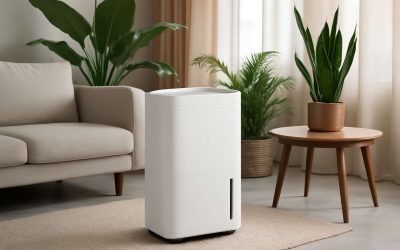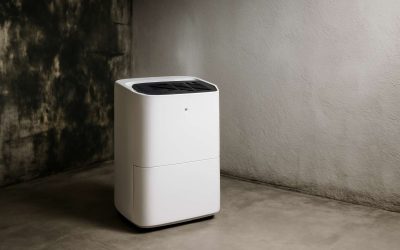
Humid weather is great for soaking up the sun, but when it comes to your home, too much humidity can lead to problems. From encouraging mold and mildew growth to causing wood to swell, excessive moisture can cause damage and affect air quality. If you want to reduce the amount of moisture in your home’s air, an air dehumidifier may be just what you need.
Unlike standard air conditioners, which transfer heat energy to the air, an air dehumidifier uses electric power to cool the air. However, instead of transferring the cool air into the room’s conditioned space, the dehumidifier’s evaporator absorbs the water in the air to release it back into its reservoir. As it releases this water, the dehumidifier also pulls warm air from the room to help keep the humidity in check.
An air dehumidifier can be useful in areas of your house that tend to be damp, like basements, laundry rooms and bathrooms. High humidity levels can lead to the development of mildew, mold and fungus. This is problematic for anyone with sensitive health, including asthma sufferers who can have a hard time breathing when exposed to these allergens. Dehumidifiers can help reduce the presence of these allergens in your home, which may improve your allergies and asthma symptoms.
You may also want to consider using a dehumidifier in rooms where you store valuables, such as photos and books. These items are especially sensitive to humidity, and will deteriorate over time if it’s not kept at a moderate level. Keeping humidity low with a dehumidifier can also protect your belongings from water damage.
If your home has suffered from a flood or leak, a dehumidifier can be helpful in drying out affected rooms and furniture. It can also be used to prevent mold and mildew, which are very difficult to eliminate once they’ve started growing in a damp area of your home.
An air dehumidifier is a good investment if you suffer from seasonal or persistent allergies to dust mites, fungus and mold. These allergens thrive in moist conditions and can trigger allergy and asthma symptoms, according to the National Institutes of Health. Dehumidifiers can help lower the level of these allergens in your home, improving your symptoms and protecting your belongings.
When selecting an air dehumidifier, you should pay attention to the appliance’s size and capacity, as well as the method of water storage. Some models have a removable bucket that must be regularly emptied, while others offer the option of hooking a hose to the device and pumping the collected water straight into a floor drain or sink. In addition, you should be aware of the operating costs and maintenance needs of the dehumidifier. Some require frequent emptying of the collection tank, while others need regular filter replacement and cleaning of the condensation compartment. You should also pay attention to the appliance’s noise levels and energy efficiency, which can vary widely between models.



0 Comments